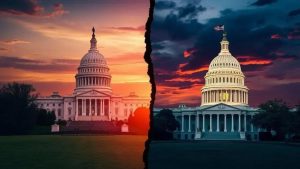Supreme Court case on religious charter schools raises questions

Anúncios
The Supreme Court case on religious charter schools raises critical debates around educational choice, funding, and the separation of church and state, significantly impacting traditional public school systems.
The Supreme Court case on religious charter schools has sparked a heated debate across the nation. As various stakeholders weigh in, it’s crucial to understand the broader implications this case could have on educational policies.
Anúncios
Background of the Supreme Court case
The background of the Supreme Court case regarding religious charter schools is important for understanding the context of the ongoing debate. This case focuses on the legal and educational ramifications of whether religious schools can receive public funding. Historically, discussions around church-state separation have influenced many policies, and this case brings them back into the spotlight.
Historical Context
The roots of the issues at play can be traced back to earlier rulings on educational funding. Over the years, many states have grappled with how to approach religious education in relation to public resources.
Anúncios
Key Dates and Events
- 2000 – The Supreme Court ruled in favor of school vouchers in Zelman v. Simmons-Harris.
- 2017 – The Trinity Lutheran Church v. Comer case allowed public funding for religiously affiliated organizations to some extent.
- 2020 – The Espinoza v. Montana Department of Revenue decision further expanded the discussion on funding for religious schools.
These events highlight the evolving landscape of how education and religion intersect. Each ruling has contributed layers of complexity to the current case.
Many advocate for the inclusion of religious charter schools in public funding, arguing that it promotes choice and equality in education. However, opponents worry about the implications for public accountability and the separation of church and state. The case thus encapsulates a fundamental conflict about rights and responsibilities in the education system.
Key arguments for religious charter schools

When discussing the key arguments for religious charter schools, supporters often highlight several compelling points. These arguments focus on educational choice, parental rights, and the benefits of school diversity.
Educational Choice
Advocates argue that religious charter schools provide families with options that better align with their values and beliefs. For many parents, the ability to choose a school that incorporates religious teachings is essential for their children’s education.
Parental Rights
Another argument is centered on parental rights. Supporters claim that parents should have the autonomy to decide how religious content is integrated into their children’s education. They believe that government restrictions violate their rights to raise their children according to their beliefs.
- Religious charter schools promote personal beliefs.
- They offer families alternatives to public school curricula.
- Parents can ensure their children learn in a supportive environment.
Furthermore, proponents of religious charter schools highlight that these institutions can foster a sense of community. They argue that schools grounded in faith can create supportive environments that nurture students’ personal growth.
Additionally, advocates point out that religious charter schools often achieve impressive academic results. Many of these schools apply rigorous academic standards, which they believe contribute to higher student achievement rates. This argument reinforces the idea that religious instruction does not detract from academic success; rather, it might enhance it.
Opposing views and concerns
While there are strong arguments in favor of religious charter schools, there are also significant opposing views and concerns. Critics raise various issues that challenge the establishment and funding of these schools.
Separation of Church and State
A primary concern is the principle of separation of church and state. Many argue that allowing public funds to support religious schools blurs the lines between government and religious institutions. This concern is rooted in the idea that public education should remain neutral regarding religious beliefs.
Public Accountability
Another concern involves public accountability. Critics argue that religious charter schools may not be subject to the same level of oversight and standards as public schools. This raises questions about educational quality and adherence to curriculum guidelines.
- Potential lack of transparency in funding.
- Concerns about adherence to educational standards.
- Issues related to discrimination in admissions.
Additionally, there are fears that religious charter schools could promote a narrow view of morality and ethics. Critics worry that the curriculum may prioritize specific religious teachings over broader educational content, limiting students’ exposure to diverse perspectives.
This opposition also emphasizes that funding religious charter schools may divert resources from secular public schools, potentially disadvantaging students who rely on traditional public education.
Potential impact on education systems

The potential impact on education systems due to the rise of religious charter schools is significant and multifaceted. As these schools gain traction, they may alter the landscape of education in various ways.
Resource Allocation
One of the most discussed impacts is how funds are allocated. If religious charter schools receive public funding, this could divert financial resources from traditional public schools. Such a shift might lead to budget cuts in vital areas like teacher salaries, extracurricular programs, and school maintenance.
Student Enrollment Dynamics
Moreover, the increased popularity of religious charter schools may shift student enrollment patterns. Families seeking a faith-based education might choose these options over local public schools, leading to fluctuating enrollment numbers in those institutions.
- Traditional public schools might face declining student populations.
- Religious schools may experience growth, impacting local demographics.
- School closures could occur if public enrollment drops significantly.
Additionally, the presence of religious charter schools might incentivize traditional public schools to enhance their offerings. These schools may adopt new curricula or teaching methods to remain competitive, leading to overall improvements in education quality.
Experiences from other regions show that angry reactions to such changes can lead to a substantial debate about the role of religion in public education. This ongoing discussion centers on the balance between providing choices for families while ensuring that public schools remain inclusive and adequately funded. By examining these factors, it becomes clear that the impact on education systems will unfold over time, with both challenges and opportunities arising from the integration of religious charter schools.
Responses from lawmakers and educators
The responses from lawmakers and educators regarding religious charter schools have been varied and insightful. As this debate unfolds, different perspectives shape the discussion around educational policies.
Lawmakers’ Perspectives
Many lawmakers express concern about the implications of funding religious charter schools with taxpayer money. Some argue that this could undermine the separation of church and state. Others emphasize the importance of providing families with choices, advocating for parental rights to choose educational paths that align with their values.
Educators’ Concerns
Educators often voice their worries about the potential impact on public education systems. They are concerned that funding initiatives for religious schools may divert necessary resources away from public schools. This could lead to larger class sizes, fewer materials, and diminished support for students in traditional educational settings.
- Public school teachers fear losing essential funding.
- There is anxiety about maintaining educational equity.
- Some educators support the initiative, seeing it as an opportunity for innovation.
Furthermore, reactions from the education community can be highly polarized. Some educators believe that competition from charter schools can drive improvement in public schools. Others worry that it may encourage a lack of accountability in both religious and non-religious educational environments.
Lawmakers also have differing opinions within their political parties, reflecting broader societal debates about the role of religion in public life. These discussions can significantly influence policy decisions and the future landscape of education.
What the future holds for charter schools

The future of charter schools is uncertain, but it promises to be shaped by ongoing developments in educational policy and societal attitudes. As more families seek educational options, charter schools might continue to grow in popularity.
Expansion Trends
Many experts believe that charter schools will see an increase in enrollment. As communities learn about these educational alternatives, more parents may choose them for their children. This trend is especially true in areas where traditional public schools may be struggling.
Policy Changes
Changes in state and federal policies will also play a crucial role in shaping the future of charter schools. Laws that support funding for religious charter schools may increase their presence. While supporters anticipate growth, critics worry about the potential negative impacts on public funds.
- Potential for new charter schools to open.
- Increased diversity in educational offerings.
- Greater focus on accountability and performance standards.
Moreover, the competition between charter schools and traditional public schools could lead to enhancements in educational quality overall. This dynamic might push all schools to innovate and improve their programs.
Future discussions around religious charter schools will likely continue to spark debate. Parents, educators, and lawmakers will need to navigate this complex landscape. As this unfolds, it will be essential to monitor how these changes impact student learning outcomes and community involvement.
FAQ – Frequently Asked Questions about Religious Charter Schools
What are religious charter schools?
Religious charter schools are publicly funded schools that incorporate religious teachings and practices into their educational programs.
How do religious charter schools impact traditional public schools?
They may draw students away from traditional public schools, which can affect their funding and resources.
What are the arguments for and against religious charter schools?
Supporters argue for educational choice and community values, while critics express concerns about funding, accountability, and separation of church and state.
What trends are expected for the future of charter schools?
An increase in enrollment and potential policy changes are likely, as more families seek educational alternatives.






